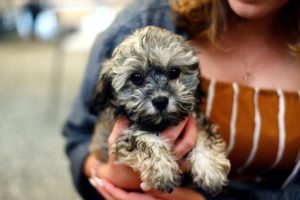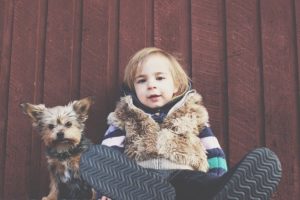For the next two months, even if everything went smoothly with the birth, you have a lot of work to do! After the birthing process, clean up the mother as much as possible without upsetting her using a warm water and washcloth. Do not use any soaps or disinfectants unless instructed to by your veterinarian. Remove any soiled newspaper or bedding from her whelping box.
Normally the new mother will spend most of her time with the puppies. For the first few days it may be difficult to get her to leave the nest even to go to the bathroom. However, it is important that she continue to urinate and defecate normally. Do not be afraid of putting her on a collar and leash and taking her out for a short period if she refuses to go on her own. She will only want to be out for a few minutes but during that time you can clean up the bed and make the whelping box safe for the puppies.
Before she returns to her puppies, check her nipples and vulva to make sure there are no problems such as bleeding, foul smelling discharges, or any other abnormalities.
Do I have to check the puppies?
It is recommended, particularly with a first time mother, to check the puppies every few hours to make sure they are all suckling and are warm and contented. Any puppies that are crying or appear cold should be placed on the inguinal (hind) teats and checked frequently to make sure they are not being pushed away by the other puppies. The teats between the hind legs generally give the most milk.
Is it necessary to have a post-natal veterinary check?
It is important to have the mother and puppies examined by your veterinarian within forty-eight hours of birth. The veterinarian will check the mother to make sure there is no infection and that she is producing sufficient milk. The puppies will also be examined to make sure that there are no birth defects such as cleft palates. Any necessary medications or injections will be administered during this visit.
What shall I do if the mother refuses to stay with the puppies?
This is common with pets that are closely attached to their owners. If the mother will not stay with her puppies, try relocating mother and puppies so she can be nearer to you.
“Puppies cannot maintain their own body heat for a week or two after birth.”
Make sure the puppies are kept warm. Young puppies cannot maintain their own body temperature for a week or two after birth.
As long as the puppies stay close to their mother, the room temperature is not too critical. However, if the mother leaves her puppies alone, they need to be provided with an external source of warmth. During the first four days of life, the environmental temperature where the puppies are kept should be maintained at 85 -90°F (29.5-32°C). The temperature may then be gradually decreased to approximately 80°F (26.7°C) by the seventh to tenth day and to about 72°F (22.2°C) by the end of the fourth week.
It is not necessary to heat the whole room to these temperatures. Heating the area over the whelping box with the aid of a heat lamp is usually all that is necessary. The larger the litter the lower the environmental temperature needs to be, since the puppies will huddle together and keep each other warm. The puppies’ behavior and condition gives an indication whether they are comfortable and healthy. If they are warm and content they will be quiet and gaining weight, otherwise they will be restless and crying.
Should I weigh the puppies regularly?
Yes. Electronic kitchen or postal scales allow accurate and regular weighing of puppies. This gives a guide to their condition and progress. Puppies that fail to gain weight or begin to lose weight should be examined by your veterinarian as soon as possible.
Take care of these points if you have a new member in your house to take care of.







